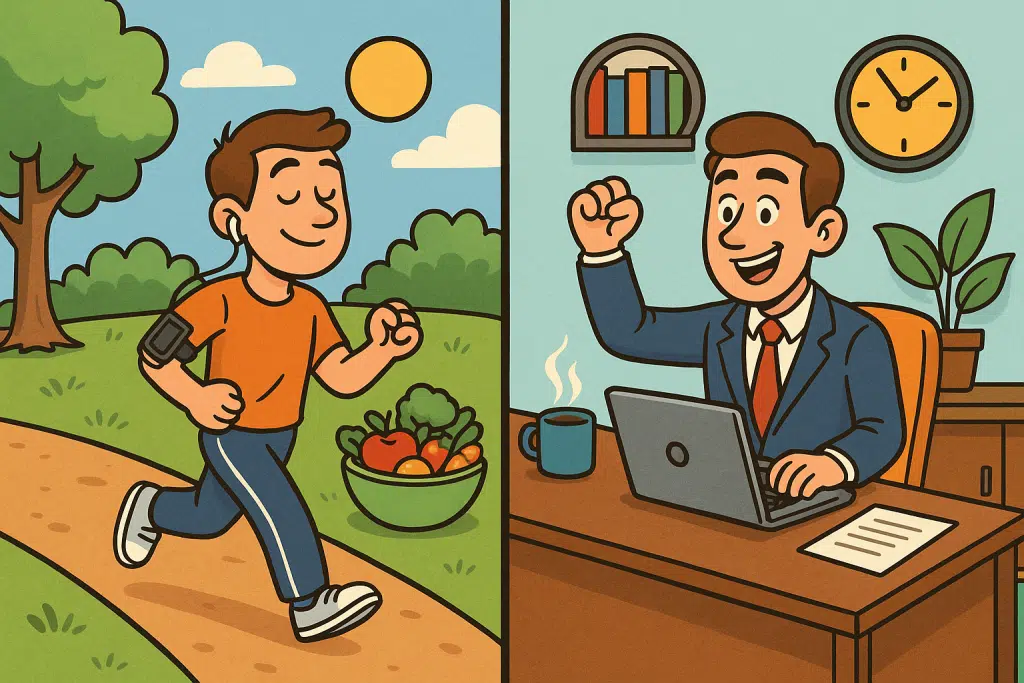How Prioritizing Your Health Leads to Greater Career Performance
Charlotte Stone August 7, 2025
There’s a quiet revolution happening in the workplace. It has nothing to do with AI, hybrid work setups, or even productivity tools. It’s health.
No longer just a personal goal or a fitness influencer talking point, health is quickly becoming a non-negotiable strategy for peak career performance. Top executives, high-performing creatives, and thriving remote workers are proving that the new professional edge isn’t hustle — it’s wellness.

Why Health is Now a Career Strategy
We’re living in an age where burnout is normalized, hustle culture is finally being questioned, and hybrid work has blurred the lines between personal and professional. In this new era, mental clarity, energy, and emotional resilience are more valuable than ever. That’s where health comes in.
Prioritizing your physical and mental well-being doesn’t just make you feel better. It directly improves:
- Cognitive function
- Decision-making skills
- Focus and attention span
- Emotional regulation
- Problem-solving ability
A 2023 meta-analysis published in The Lancet Public Health found that even mild physical activity significantly reduced work-related fatigue and improved cognitive clarity, especially in knowledge workers.
In other words, your morning walk might be doing more for your KPIs than your fourth cup of coffee.
The Data Behind Health and Performance
Let’s look at the evidence. These aren’t just wellness guru mantras:
- Mental Health and Productivity
- According to the World Health Organization, depression and anxiety disorders cost the global economy 1 trillion US dollars per year in lost productivity.
- A study from Oxford University’s Saïd Business School found that happy employees are 13% more productive.
- Physical Fitness and Brain Function
- Harvard Health reports that regular aerobic exercise boosts the size of the hippocampus, the brain area involved in learning and memory.
- The CDC found that employees who engage in physical activity experience 27% fewer days of poor mental health.
- Sleep and Career Outcomes
- Research from the RAND Corporation shows that insufficient sleep costs the U.S. economy 411 billion US dollars annually.
- People who get 7-9 hours of quality sleep perform better in tasks requiring memory, reasoning, and decision-making.
Emerging Trends: Health Meets Career Development
So, what’s new in this space? Health is no longer separate from work — it’s becoming the foundation for long-term career development.
1. Workplace Wellness Tech
From apps like Wellable and Limeade to biometric wearables like WHOOP and Oura Ring, professionals are tracking sleep, stress, HRV, and even blood oxygen to optimize their day.
These tools aren’t just for athletes anymore. Executives now use them to schedule meetings around their energy cycles or take breaks when stress spikes.
2. Health-Conscious Leadership
CEOs are publicly advocating for fitness and mindfulness. Sundar Pichai (Google) and Arianna Huffington (Thrive Global) have become champions of rest, meditation, and mental health as tools for better leadership.
When leaders model self-care, it gives permission for employees to follow suit. And spoiler: performance improves across the board.
3. Flexible Work and Health Routines
Hybrid and remote work has made it easier to fit workouts, meal prep, and mindfulness into the workday. But only if you’re intentional.
Those who prioritize health routines during breaks report better task-switching abilities and less end-of-day fatigue.
How to Make Health Your Career Catalyst
Okay, so the science is there. The culture is shifting. Now let’s make it practical. Here’s how you can prioritize your health and watch your career performance follow suit:
1. Start With Sleep Hygiene
This isn’t glamorous, but it’s essential. Sleep affects everything from memory consolidation to mood regulation.
How to do it:
- Keep a consistent sleep schedule (even on weekends)
- Avoid screens 90 minutes before bed
- Reduce caffeine intake after 2 PM
- Try a wind-down routine: dim lights, read fiction, use lavender oil
2. Exercise for Focus, Not Just Fitness
You don’t need a six-pack. You need energy, clarity, and endurance to handle long days.
Try this:
- 20-minute brisk walk in the morning
- 5-minute stretch or mobility break every 90 minutes
- Use walking meetings to boost creativity
3. Master the Work-Health Rhythm
Productivity isn’t about working more. It’s about working smarter. Healthier people recover better and think faster.
Practical tactics:
- Use the Pomodoro method with 5-10 minute movement breaks
- Don’t eat lunch at your desk
- Block one hour a week for a health review (meals, steps, stress, sleep)
4. Refuel Like It Matters (Because It Does)
Forget fancy diets. Focus on sustainable energy.
Power meal guidelines:
- Protein + fiber-rich carbs + healthy fats = steady focus
- Hydrate like your brain depends on it (because it does)
- Cut sugar crashes: no pastries before presentations
5. Train Your Brain to Reflect, Not React
Reflection is the missing productivity tool. It helps you course-correct, set smarter goals, and protect your time.
Health practices that boost reflection:
- 10-minute daily journaling (try prompts like “What drained me today?”)
- Evening walks without your phone
- Box breathing when switching between tasks
The Home Factor: Your Health Basecamp
Let’s not pretend home doesn’t affect career performance. If your home space is cluttered, chaotic, or unhealthy, your work will reflect that.
Quick upgrades:
- Create a designated “wellness corner” with a yoga mat, foam roller, or journal
- Keep water within reach of every workstation
- Meal prep on Sundays to avoid last-minute junk food
Home isn’t just where you rest. It’s where you build habits that carry you through your workweek.
Case Study: The Health-First Professionals
- James Clear, author of Atomic Habits, built his entire writing career on the back of health-based routines. His morning routine (sleep, hydration, movement) protects his creative time.
- Mel Robbins uses cold showers, fasting, and short outdoor walks to maintain energy for public speaking and content creation.
- Dr. Rangan Chatterjee, host of the Feel Better, Live More podcast, says, “The most effective medicine in the world is lifestyle change.”
These aren’t just random success stories. They reflect a shift happening across knowledge work, entrepreneurship, and even corporate cultures.
Let’s Talk ROI: Health Pays Off
When you prioritize your health, you don’t just avoid illness. You:
- Make faster decisions
- Communicate more clearly
- Bounce back from setbacks
- Manage stress without crashing
- Create space for long-term thinking
All of which make you more valuable at work. Period.
According to a 2022 report by the American Psychological Association, organizations that support employee health and well-being see:
- 23% higher profitability
- 41% lower absenteeism
- 66% higher employee engagement
Those stats don’t lie. Wellness is a work advantage.
The Final Word
Prioritizing your health isn’t just self-care. It’s a strategy for career growth, mental clarity, and sustainable high performance.
Start small. Build daily habits. Protect your energy.
Because your future career isn’t powered by hustle. It’s powered by health.
References
1. Harvard Business Review. (2021). What Happens When Your Career Takes Priority Over Your Health.
https://hbr.org/2021/06/
2. World Health Organization. (2022). Mental Health and Work: New Evidence and Tools for Decision-Makers. https://www.who.int/
3. Forbes. (2023). Why Employee Wellness Is The Secret To Productivity.
https://www.forbes.com/







